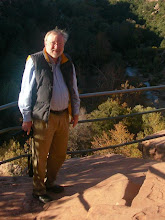Colin Powell gave an eloguent endorsement of Obama on NBC's
Face the Nation this morning. I understand Powell's rationale, and it is pretty sound. Obama could be a 'New Frontier' kind of guy, in ways similar to JFK. There is no doubt that Obama has skills as demonstrated by his oratory. He is intelligent. Of that there is no doubt.
My concern remains 'Where is this man on the liberal scale?' His record puts him way left, further left than I have ever voted. His rhetoric moves him slightly right of his voting record, still left of my idealism.
I had wanted McCain to choose Joe Lieberman as his running mate. Now this is a true 'Maverick' position. Instead, he cowtowed to the conservative right and chose Sarah Palin. Palin is an interesting character, besieged by liberal media who want to declare her unqualified. The media crucify her for her lack of understanding of international affairs. How unfair! She is a state govenor. Her qualifications for being a govenor of a state is that she understand the state issues. She beat out a lot of people to be elected govener because she has spunk.
Sarah Palin has shown she can compete. Her qualifications are very similar to Bill Clinton's when he was elected president. True, Bill Clinton is an eloquent speaker, and true, Bill Clinton is a bright guy, but both Clinton and Palin had similar experiences before emerging on the national scene. And there is another important difference. Clinton was running for president, and Palin is running for vice-president.
McCain is clearly the more experienced leader of the bunch, and has consistently demonstrated his ability to work both sides of the aisle to get things done, collaborating with the liberal likes of Ted Kennedy and Russ Feingold to introduce legislation.
Powell's dismissal of Palin as unqualified is assuming that she is running for president. She is not. McCain is running for president, and the odds of Palin ascending to the presidency in McCain's first term are less than 20% from a health standpoint.
Consider this: a 20% probability Palin will be president in the next 4 years if McCain is elected vs. 100% probability that Obama will be president if he is elected.
I stand with John McCain, because I believe he will maintain some semblance of Federalist principles, while taking a far more moderate approach to governance. Sorry, General Powell, we just disagree. I still plan to vote for John McCain.
